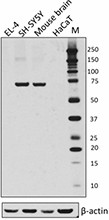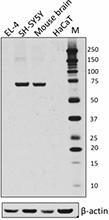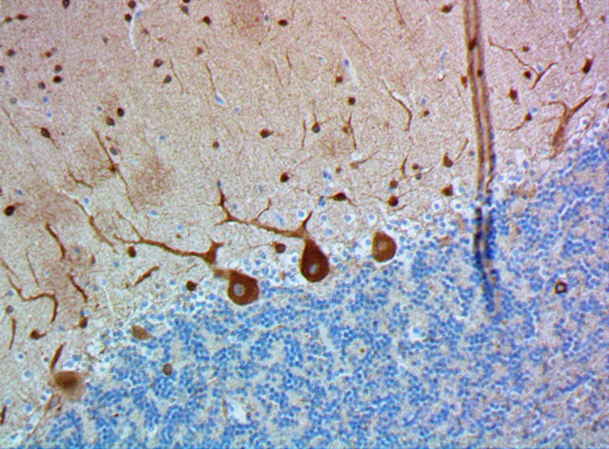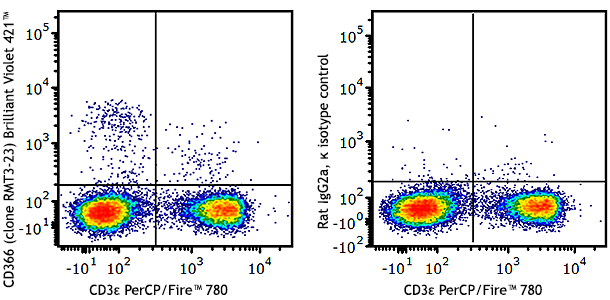- Clone
- W16079A (See other available formats)
- Regulatory Status
- RUO
- Other Names
- Sterile alpha and TIR motif-containing protein 1, Sterile alpha and Armadillo repeat protein, Sterile alpha motif domain-containing protein 2 (SAMD2), MyD88-5, Tir-1 homolog.
- Isotype
- Rat IgG1, κ
- Ave. Rating
- Submit a Review
- Product Citations
- publications

-

Total protein (15µg protein) from EL-4 (negative control), SH-SY5Y, mouse brain and HaCaT (negative control) were resolved by 4-12% Bis-tris gel electrophoresis, transferred to nitrocellulose, and probed with 2µg/mL purified anti-SARM1 antibody (clone W16079A ) antibody (upper). Proteins were visualized using a goat anti-rat-IgG secondary antibody conjugated to HRP and chemiluminescence detection. Direct-Blot™ HRP anti-β-actin Antibody was used as a loading control (lower).
| Cat # | Size | Price | Quantity Check Availability | Save | ||
|---|---|---|---|---|---|---|
| 696602 | 100 µg | 221€ | ||||
SARM1 (Sterile alpha and TIR motif-containing protein 1), also known as SAMD2, is a member of the TIR-containing adaptor family. Unlike other TLR adaptor proteins, SARM1 does not activate NF-κB signaling pathway and has been found to be a negative regulator of Toll-Like Receptor-activated transcription. SARM1 is highly expressed in the brain by neurons and has been liked to axonal degeneration following viral infection, axon injury, or oxygen glucose deprivation. Multimerization of SARM1 mediated by the evolutionarily conserved SAM domain is required for its pro-degenerative function. SARM1 also participates in the regulation of neuronal polarity, axonal outgrowth, and brain morphogenesis. Mice deficient in SARM1 demonstrated reduced dendritic arborization and brain size.
Product DetailsProduct Details
- Verified Reactivity
- Human, Mouse
- Antibody Type
- Monoclonal
- Host Species
- Rat
- Immunogen
- Partial mouse SARM1 recombinant protein (1-410 a.a.) expressed in E. coli.
- Formulation
- Phosphate-buffered solution, pH 7.2, containing 0.09% sodium azide.
- Preparation
- The antibody was purified by affinity chromatography.
- Concentration
- 0.5 mg/ml
- Storage & Handling
- The antibody solution should be stored undiluted between 2°C and 8°C.
- Application
-
WB - Quality tested
- Recommended Usage
-
Each lot of this antibody is quality control tested by Western blotting. For Western blotting, the suggested use of this reagent is 0.5 - 2.0 µg per ml. It is recommended that the reagent be titrated for optimal performance for each application.
- Product Citations
-
- RRID
-
AB_2687069 (BioLegend Cat. No. 696602)
Antigen Details
- Structure
- 724 amino acids with a predicted molecular weight of 79.3 kD. Contains two SAM (sterile alpha motif) domains and a TIR (Toll/interleukin-1 receptor) domain.
- Distribution
-
Cytoplasm. Motochondrion.
- Function
- SARM1 is an adaptor molecule belonging to the TIR-containing adaptor family. SARM1 is a negative regulator of Toll-Like Receptor-mediated signaling and is required for axonal degeneration and brain morphogenesis.
- Biology Area
- Cell Biology, Signal Transduction
- Antigen References
-
1. Summers DW, et al. 2016. Proc. Natl. Acad. Sci. USA. 113:E6271.
2. Loreto A, et al. 2015. Cell. Rep. 13:2539.
3. Mukherjee P, et al. 2015. J. Immunol. 195:4913.
4. Gerdts J, et al. 2015. Science. 348:453.
5. Gilley J, et al. 2015. Cell. Rep. 10:1974.
6. Gerdts J, et al. 2013. J. Neurosci. 33:13569. - Gene ID
- 23098 View all products for this Gene ID
- UniProt
- View information about SARM1 on UniProt.org
Related Pages & Pathways
Pages
Related FAQs
Other Formats
View All SARM1 Reagents Request Custom Conjugation| Description | Clone | Applications |
|---|---|---|
| Purified anti-SARM1 | W16079A | WB |
Customers Also Purchased
Compare Data Across All Formats
This data display is provided for general comparisons between formats.
Your actual data may vary due to variations in samples, target cells, instruments and their settings, staining conditions, and other factors.
If you need assistance with selecting the best format contact our expert technical support team.
-
Purified anti-SARM1

Total protein (15µg protein) from EL-4 (negative control), S...

 Login / Register
Login / Register 










Follow Us